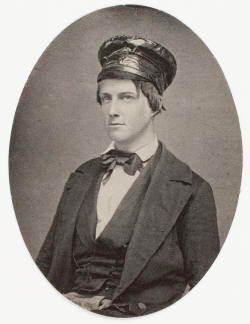

Queer Places:
Harvard University (Ivy League), 2 Kirkland St, Cambridge, MA 02138
Oak Hill Cemetery
Lake Geneva, Walworth County, Wisconsin, USA
 Edmund Quincy Sewall, Jr. (February 29, 1828 - September 26, 1908) was the Controller of the Chicago, Milwaukee & St. Paul railroad.
Edmund Quincy Sewall, Jr. (February 29, 1828 - September 26, 1908) was the Controller of the Chicago, Milwaukee & St. Paul railroad.
Edmund Quincy Sewall, Jr. was born on 29 February 1828 in Newburyport, Essex County, Massachusetts. He was the son of Rev. Edmund Quincy Sewall and Caroline Ward, the daughter of Col. Joseph Ward and Prudence Bird. Edmund Quincy Sewall, Sr. was a descendent of Henry Sewall who came to New England in 1634. Henry’s grandfather, Henry, was a mayor of Coventry, England. Henry Sewall did not agree with the English politics and had his son and family to move to New England with him in 1634. Henry came with his wife Jane Dummer and his first five of their eight children, including a nine-year-old Samuel Sewall. Samuel Sewall married Hannah Hull and had fourteen children. He was a Chief Justice of Massachusetts Supreme Court and presided over the Salem witch trials. Only six of his fourteen children survived beyond childhood and only the two sons lived into their seventies. One of the sons was Joseph Sewall who married Elizabeth Walley. They only had one child that lived into adulthood, Samuel Sewall. Joseph was pastor of the Old South Church of Boston. His son Samuel married Elizabeth Quincy and had seven children. Samuel was a merchant and a deacon at his father’s church, Old South Church. Samuel son, Samuel, followed in his great-grandfather’s footsteps and became a Chief Justice of Massachusetts Supreme Court. Samuel married Abigail Devereux and had nine children, the seventh child being Edmund Quincy Sewall. Edmund Quincy Sewall, Jr, is related to Louisa May Alcott, his second cousin. His grandfather Samuel’s sister, Dorothy, married Colonel Joseph May and had a daughter Abigail May. Abigail married Amos Bronson Alcott and had Louisa May Alcott.
The younger Sewall attended the private school in Concord, Mass., conducted by Henry David Thoreau and his brother John Thoreau. After Col. Joseph Ward’s death, Prudence Bird Ward and her daughters, including Caroline Ward, become close friends with the Thoreau family, especially Cynthia Thoreau, Henry David Thoreau’s mother, and Elizabeth, Jane, and Maria Thoreau, Henry David Thoreau’s aunts. It was Maria Thoreau who, in 1817, introduced Caroline Ward to Edmund Quincy Sewall. In 1833, Prudence Ward and her daughter, Prudence, moved to Concord and lived in a house owned by John Thoreau, Sr., Henry David Thoreau’s father. They lived there until Prudence Ward’s death in 1844. In 1836, Caroline brought her daughter Ellen to visit her grandmother, aunt and the Thoreaus. Caroline took her son Edmund on a similar trip in 1839. It was this same year that Ellen (age 17) paid another visit by herself. She attracted the attention of both John Thoreau, Jr. and Henry David Thoreau. Both John and Henry corresponded with Ellen as well as sent her other items. Henry sent her poems and John sent her crystals and stones for her mineral specimen box. In 1840, Edmund became a pupil at the Thoreau school. In July 1840, John proposed to Ellen. She initially accepted, but eventually declined due to her father’s wishes and because she was concerned for her father’s health. In November of the same year, Henry also proposed to Ellen. Since she declined John, she had to decline Henry. Years later, she told her daughters, Elizabeth and Louise, that she regretted accepting John’s proposal since she cared more for Henry. Henry told his sister, Sophia, on his deathbed that he never got over his love for Ellen. Ellen remained close to Sophia Thoreau. They wrote often until Sophia’s death in 1876. Just before her death, Sophia sent Ellen a scrapbook that had been started by John, then was used by Henry after John’s death, and was continued to be used by Sophia after Henry’s death. Ellen’s aunt, Prudence, was a close confidante to Maria Thoreau, which continued for years even after Prudence left Concord in 1844. Prudence Ward died on June 2, 1874 and Maria Thoreau died in 1881.
Henry David Thoreau took Ralph Waldo Emerson's lofty model of platonic love as his own. He used this model to explain the emotional attraction he felt for certain men who came into his life, like the Canadian woodcutter Alek Therian, whom Thoreau would encounter in his walks around Walden Pond. In the summer of 1839, Thoreau was smitten by the young brother of a family friend, Edmund Sewall, who was in Concord for a visit. The love poem, "Lately, Alas I Knew a Gentle Boy", written to the object of his affection is remarkable for its candor. Sewall's diary chronicles his studies with the Thoreaus, March 28-May 16 1840. The school was noted for its educational innovations and the Thoreaus stressed “learning by doing.” Sewall records the numerous field trips the students took and also describes other aspects of school life important to young boys: pranks, meals, and assigned compositions.
Sewall graduated in 1847 from Harvard B.A., and married Louisa Kilham Lovett, daughter of Samuel Porter Lovett and Lucy Chapman, on 27 November 1852 in Beverly, Massachusetts, the marriage being conducted by The Rev. Edmund Quincy Sewall of Cohasset assisted by the Rev. Christopher T. Thayer.
He adopted civil and railroad engineering as his profession. He was successively superintendent of the Delaware R.R., superintendent at New Orleans of the N.O.I. and Gr. N.R.R., superintendent of the St. Paul & Pacific R.R., treasurer and later superintendent of the Duluth R.R., and finally comptroller of the C.N. & St. Paul R.R./p>
Edmund Quincy Sewall and his family appear on the census of 1880 at St. Paul, Ramsey County, Minnesota. He died on 26 September 1908 in Lake Geneva, Wisconsin, at the age of 80.
My published books: